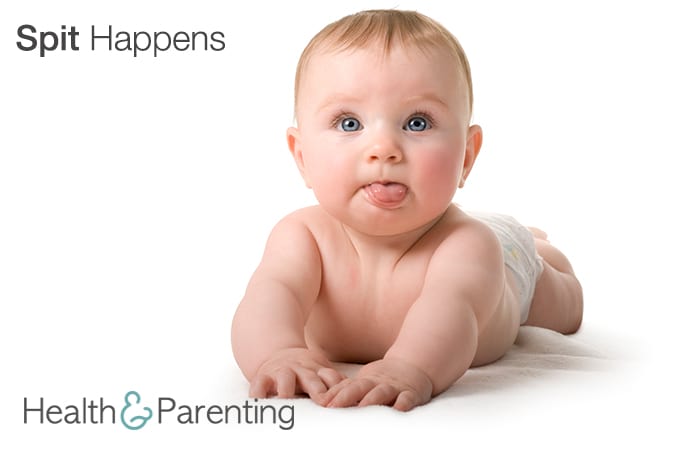One of the most helpful things my baby’s doctor said to me was that baby spit-up is most often a laundry problem not a health problem. As a new parent, though, how are you to tell?
What’s normal?
Because your baby has an immature digestive tract, occasionally stomach contents will come back up. This is especially true if baby has swallowed some air while feeding or when crying. Sometimes regular burping will help, Occasionally only time brings that gas bubble to the surface – along with some of the stomach contents. If your baby doesn’t seem especially uncomfortable and is gaining weight well, he may just be a ‘happy spitter.’
Half of all babies spit up at least once per day in the first few months of life. Spitting peaks between two and four months of age. As baby grows, the muscles of the stomach and esophagus mature, making baby better at keeping it all down. By seven to eight months, spitting typically slows, and most babies don’t spit up after one year.
Is it vomiting?
If your baby seems to be spitting up copious amounts forcefully, and it’s happening frequently, it could be that your baby is sick. Are there any other signs of illness, such as, fever, increased irritability or sleeplessness, etc.? Is anyone else in the house ill? Viral illnesses typically resolve within 24 hours, but can be dangerous for a young baby. Keep your baby hydrated (breastfeed lots if baby will tolerate it) and visit your baby’s healthcare provider.
Is baby allergic to my milk or to formula?
It’s unlikely for a baby to be allergic to anything in breastmilk, but occasionally babies have a sensitivity to cow’s milk protein (whether from breastmilk or formula). Other symptoms of food allergy include bloating, gassiness, diarrhea, diaper rash, green frothy bowel movements, and blood or mucous in baby’s stool.
Is it reflux?
While all spitting is considered reflux, gastroesophageal reflux disease (GERD) is more serious. If your baby spits up often, seems uncomfortable, is very irritable, and isn’t gaining weight well, then your baby may be suffering from GERD. If reflux is severe, your baby’s doctor may recommend medications or sleep positions to improve comfort.
One thing most experts recommend for any type of spitting is keeping baby upright for 20 to 30 minutes after eating. Avoid overfeeding your baby – getting less milk more frequently might help. If you’re breastfeeding and have a forceful let-down or an oversupply (a common cause of spitting), getting the help of a lactation consultant can make baby (and you) more comfortable.
If your baby is just a happy spitter and doesn’t have any symptoms of allergy or reflux, then invest in some bibs and burp cloths, and keep a change of clothes handy for baby (and maybe for you!). If you aren’t sure, check with your baby’s doctor. Just like everything else with a baby, trust your instincts. While it’s probably just fine, getting it checked will give you peace of mind.
Written by Michelle, childbirth instructor, lactation consultant, and mother to 4 busy kids
This information is not intended to replace the advice of a trained medical doctor. Health & Parenting Ltd disclaims any liability for the decisions you make based on this information, which is provided to you on a general information basis only and not as a substitute for personalized medical advice. All contents copyright © Health & Parenting Ltd 2016. All rights reserved.










